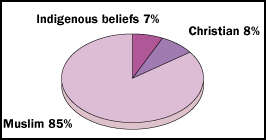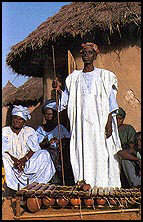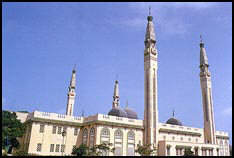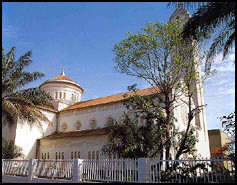 RELIGIONS RELIGIONS |
Guinea has often been the theater of sometimes bloody clashes between traditional animist religions and Islam, but both groups agree on one things: no one cannot live without religious faith. Guinea is similar to many African countries in that if atheism exists at all in it is very rare.and usually shrouds an intellectual fabric imbued with a diffuse belief in animism. That word, which many people oppose because it is held in such low esteem, defines a world view that is not confined to Africa. But it is better than "traditional African religion" and used for lack of anything better.

Religious persuasion
 Animism: basic beliefs Animism: basic beliefs |
The Concise Oxford Dictionary defines animism as "the attribution of a living soul to plants, inanimate objects and natural phenomena" and "the belief in a supernatural power that organizes and animates the material universe." The Latin root word anima originally meant the breath emanating from a creator deity-a definition that explains what animists actually believe in better than any other.
Animists believe that everything in the universe, including man, is interdependent and conceived by a single or sometimes a double entity. Conscious, mostly invisible forces that may take on a material form as inanimate objects, animals and people are what govern the cosmos, not blind mechanically. Specific actions must ward off those forces, which have the ability to destroy harmony and are a threat to humanity.
Animists in Guinea never think of individuals as isolated in time and space. In space, they are connected to their family, clan, generation, ethnic group and soon up the line to the environment and ultimately the entire cosmos. In time, individuals are links in a chain. The previous links are ancestors, who possess the two-fold advantage of having been humans, and are consequently aware of human needs and foibles, and of belonging to the invisible world, which is occupied by a hierarchy of deities culminating in God. Those divinities represent the chief deity's many aspects and, since they are less distant, they are more accessible.
The links that come after are descendants, to whom animists have the responsibility of leaving a well-balanced society, beliefs that will help them cope with the world and ways of paying due homage to the ancestors-One of whom they will be. Initiation rites cover every aspect of life and are intended for all individuals. They teach tolerance and social equality, since every individual in the same age group is taken into the forest at the same time regardless of position on the social scale.
Castes do exist in Guinea and in many other African countries, but in contrast to Hindu society, which is entirely made up of castes, only craftspeople and griots belong to them. Craftspeople include weavers, curriers, wood carvers and especially blacksmiths, who are admired and feared at the same time because they know the secrets of matter and have magic powers. Craftspeople go through the same initiation rites as everyone else but in addition receive specific training in their trade, which is passed down from father to son or, in the case of potters and dyers, from mother to daughter. Of course that training has to do with methods as well as with the relationship each object must have with the magic world to which it is connected. Consequently there are intangible rules of fabrication that are never divulged to those outside the craft.
Like North American Indians-animists whose beliefs also involve respecting nature-during their initiation rites traditional Africans learn that animals must be killed and trees cut down only when it is absolutely necessary to meet there needs. Sometimes those rules are broken. Sometimes animals have been treated better than slaves. But that does not change the basic principles, which have not been observed in other religions either. Christians, whose religion is based on love and tolerance, perpetrated the Spanish Inquisition and the genocide of American Indians. Current-day Muslim fundamentalists go on killing even during the holy month of Ramadan.
 An indifferent but tolerant God An indifferent but tolerant God |
Animists believe that God is distant and lets the forces of good and evil battle it out between themselves. But in contrast to other religions, he has never claimed to be the only true God and never demands the killing of pagans or infidels.

Since an undefinable number of deities exist on the lower rungs of the hierarchy, foreign divinities are tolerated. Africans treat them with the same hospitality they do anyone else. Strife and the insidious struggle between often equal forces that are not always the allies of humanity, ancestors or even the deities who in theory are favorable to them prevail in the lower levels. Believers must know how to interpret the divinities' desires. Just as there are intermediaries between man and God, other go-betweens clearly translate the manifestations of spirits in nature or through events. Fetish-men, mask guardians and members of secret societies are in charge of keeping public order. Everything is extraordinarily regulated right down to the slightest detail so that they can cope with any given situation. But unexpected events may still occur, such as when the intentions and actions of entities or witches defy interpretation. | Fetish-men and healers must attain a certain level of knowledge-and initiation-that is not within everyone's reach. The other side of the coin is that some of them choose to do evil in secret. Witches, who are always ill-intentioned, use magic to destroy group harmony out of self-interest, a lust for power and sometimes because an wicked force has "chosen" them. There is an ongoing struggle between the forces of good and evil, and the outcome is always uncertain.
 From fear to love From fear to love |
When former animists are asked what prompted them to convert to Christianity, they often reply, "The love of and for God." Clergymen who perform the conversions emphasize that animists live in a state of constant fear-of evil spirits, of unwittingly committing a deed that will have disastrous consequences, of an unknown witch, of a neighbor who might ask a witch to send a disease, cast a spell, "eat the soul" and cause death.
Many people who laugh at such beliefs and claim that the invisible world does not exist live in Wes1em countries where fortune-tellers and mediums make a decent living and football players who carry good luck charms perform certain rituals before a match. Anyone who has lived a while in Africa thinks twice before making a wise-crack. Animists live in a state of fear that may be burdensome, and they may think that the structured society of the past is falling apart because initiation rites, when they exist at all, are becoming shorter and simpler. But they do not become "free thinkers", and continue believing in a religion that brings them peace of mind.
 Koran or Bible? Koran or Bible? |

Although much of Guinea was converted to Islam by the sword, the Muslim fail has brought peace to the country. Today Muslims account for 80 per cent of the population and Christians 7 per cent. Sometimes, it is added, they are 100 per cent animist. And that would not be entirely wrong. Both Islam and Christianity preach faith in one God and prohibit idol worship. So why are there more Muslims than Christians in Guinea?
The die was already cast by the time the first Christian missionaries came to Guinea, even though there had not been forced conversion for centuries. The rulers of the empire of Mali did not try to influence their subjects' religious beliefs. Nor did the first Maninka-Mori of Upper Guinea. But the waves of Muslims who migrated from the north increased, and everywhere they went the newcomers set up Koranic schools that attracted students because of the teachers' reputations. An additional reason for the popularity of the Muslim faith is that, whereas Christianity preached submission to the colonial power, Islam did not.

The situation hardened under the theocratic Fulani state. The djihad did not leave the animists much choice, whether they were Fulani, Djallonke or anything else. Some Fulani had a good reason to convert to Islam, which gave them a political influence they had never had until then. But the faith of the almamys was controlled by a privileged few practising the Qadrya doctrine and was unable to win the people's hearts. In contrast, El Hadj Oumar attracted throngs of followers. Not only did was he irresistibly charismatic, but he introduced the Tidjanya doctrine, which preached that all believers are equal. Samory's forced conversions did not do much to win over the hearts of the masses. On the contrary, they sparked hatred against him.
 The result of colonialism The result of colonialism |
The colonial period was particularly conducive to the spread of Islam in Guinea. There are several reasons for this. First, like everywhere else in Africa, unlike Christianity the Muslim faith was represented by Blacks. Second, young animist men were compelled to show up for military service or migrate to the towns in search of work. Wherever they went, they realized that the French considered Muslims superior to animists and that they could accede to a privileged class by attending a Koranic school and converting. That was also the only way to hold out against Western civilization. In addition, although students had to learn the Koran by heart in Arabic, lessons were taught in local languages in villages during the evenings. Those teaching methods were much better adapted to daily life than the French schools, which were located in the main towns. A third reason is that written Arabic had been in use for a very long time, especially by Fulani intellectuals.
Like all good Muslims, converts to Islam in Guinea had to pray five times a day, fast during Ramadan, abstain from alcohol and pork, practice charity and make a pilgrimage to Mecca. All those requirements were easy to meet, and did not come into conflict with ancestor worship or animal sacrifices. In daily life the marabou replaced the fetish-man and gave out charms to ward off evil spirits or witches, who still exist. Islam was able to adapt to older customs, many of which have survived. The same is true of Catholicism, especially since some of its features such as the worship of statues and pilgrimages to pray for rain or the end of a scourge, bore a strong resemblance to animist traditions.
But fetishism and superstition are not the exclusive province of anyone religion. They are anchored in the hearts of people-even atheists. |

